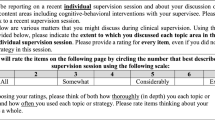Abstract
The last few decades have witnessed major growth in the evidence base on effective client interventions used by social workers and other health and social service professionals. As the pressure for service agencies to offer empirically supported treatments has been increasing, financial and time constraints have driven a decline in the frequency and amount of supervision provided within many of these organizations. While the reduction in staff supervision presents a challenge for effective implementation of all treatments, there are comprehensive empirically supported treatment models for clients that serve as exemplars of supervisory practice through their explicit requirements, processes and tools for supervision and supervisor development. After a review of the current status of supervision nationally, an implementation science-based approach is described, which builds organizational support for supervision and promotes optimal supervisory practice through training and consultation of supervisors and supervisees. The elements of this comprehensive approach, developed by the Yale Program on Supervision, are detailed. Supervisory policies, practices, and tools created by the developers of empirically supported treatments and similarly grounded in the principles of implementation science are offered as further examples of strategies for ensuring effective supervision.
Similar content being viewed by others
References
American Psychological Association, Division 12, Society of Clinical Psychology. (2013). A guide to beneficial psychotherapy. Retrieved from http://www.apa.org/divisions/div12/cppi.html on 28 Aug 2013.
Bambling, M., King, R., Raue, P., Schweitzer, R., & Lambert, W. (2006). Clinical supervision: Its influence on client-rated working alliance and client symptom reduction in the brief treatment of major depression. Psychotherapy Research, 16, 317–331.
Bellamy, J. L., Bledsoe, S. E., & Traube, D. E. (2006). The current state of evidence-based practice in social work: A review of the literature and qualitative analysis of expert interviews. Journal of Evidence-Based Social Work, 3(1), 23–48.
Borders, L. D. (2005). Snapshot of clinical supervision in counseling and counselor education: A five-year review. The Clinical Supervisor, 24, 69–113.
Bradshaw, T., Butterworth, A., & Mairs, H. (2007). Does structured clinical supervision during psychosocial intervention education enhance outcome for mental health nurses and the service users they work with? Journal of Psychiatric and Mental Health Nursing, 14, 4–12.
Center for Substance Abuse Treatment. (2009). Clinical supervision and professional development of the substance abuse counselor. Treatment Improvement Protocol (TIP) Series, No 52). DHHS Publication No. (SMA) 09-4435. Rockville, MD: Substance Abuse and Mental Health Services Administration.
Crespi, T. D., & Dube, J. M. B. (2005). Clinical supervision in school psychology: Challenges, considerations, and ethical and legal issues for clinical supervisors. The Clinical Supervisor, 24(1–2), 115–135.
Dakof, G., Liddle, H., & Rowe, C. (2012). MDFT training and supervision manual. Miami, FL: MDFT International.
Drake, R. E., & Deegan, P. E. (2009). Shared decision making is an ethical imperative. Psychiatric Services, 60, 1007.
Ellis, M. V., Siembor, M. J., Swords, B. A., Morere, L., & Blanco, S. (2008). Prevalence and characteristics of harmful and inadequate clinical supervision. Unpublished manuscript presented at the 4th annual International Interdisciplinary Clinical Supervision Conference, Buffalo, NY.
Fixsen, D. L., Naoom, S. F., Blase, K. A., Friedman, R. M., & Wallace, F. (2005). Implementation research: A synthesis of the literature. Tampa, FL: University of South Florida, Louis de la Parte Florida Mental Health Institute, The National Implementation Research Network (FMHI Publication #231).
Henggeler, S. W., Schoenwald, S. K., Borduin, C. M., Rowland, M. D., & Cunningham, P. B. (2009). Multisystemic therapy for antisocial behavior in children and aolescents (2nd ed.). New York: Guilford Press.
Hoge, M. A., Migdole, S., Farkas, M. S., Ponce, A., & Hunnicutt, C. (2011). Supervision in public sector behavioral health: A review. The Clinical Supervisor, 30, 183–203.
Kadushin, A., & Harkness, D. (2002). Supervision in social work (4th ed.). New York: Columbia University Press.
Kavanagh, D. J., & Connolly, J. M. (2009). Interventions for co-occurring addictive and other mental disorders. Addictive Behaviors, 34, 838–845.
Kowinsky, A., Greenhouse, P. K., Zombek, V. L., Rader, S. L., & Reidy, M. E. (2009). Care management redesign: Increasing care manager time with patients and providers while improving metrics. The Journal of Nursing Administration, 39, 388–392.
Liddle, H. (2002). Family therapy for adolescent cannabis users, cannabis youth treatment series, volume 5. DHHS Pub. No. 02-3660 Rockville, MD: Center for Substance Abuse Treatment, Substance Abuse and Mental Health Services Administration.
New Freedom Commission on Mental Health. (2003). Achieving the promise: Transforming mental health care in America. Retrieved from http://govinfo.library.unt.edu/mentalhealthcommission/ on 28 Aug 2013.
Paris, M., & Hoge, M. A. (2010). Burnout in the mental health workforce: A review. Journal of Behavioral Health Services and Research, 37, 519–528.
Rice, F., Cullen, P., McKenna, H., Kelly, B., Keeney, S., & Richey, R. (2007). Clinical supervision for mental health nurses in Northern Ireland: Formulating best practice guidelines. Journal of Psychiatric and Mental Health Nursing, 14, 516–521.
Schroffel, A. (1999). How does clinical supervision effect job satisfaction? The Clinical Supervisor, 18, 91–105.
Sexton, T. L. (2011). Functional family therapy in clinical practice. New York: Routledge.
Sholomskas, D., Syracuse-Siewert, G., Rounsaville, B., Ball, S. A., Nuro, K., & Carroll, K. (2005). We don’t train in vain: A dissemination trial of three strategies of training clinicians in cognitive-behavioral therapy. Journal of Consulting and Clinical Psychology, 73, 106–115.
Shulman, L. (2010). Interactional supervision (3rd ed.). Washington, DC: National Association of Social Workers Press.
Spence, S. H., Wilson, J., Kavanagh, D., Strong, J., & Worrall, L. (2001). Clinical supervision in four mental health professions: A review of the evidence. Behaviour Change, 18(3), 135–155.
Stuart, G. W., Tondora, J., & Hoge, M. A. (2004). Evidence-based teaching practice: Implications for behavioral health. Administration and Policy In Mental Health, 32, 107–130.
Szapocznik, J., Hervis, O., & Schwartz, S. (2003). Therapy manuals for drug addiction: Brief strategic family therapy for adolescent drug abuse. Bethesda, MD: National Institute on Drug Abuse.
Tebes, J. K., Matlin, S. L., Migdole, S. J., Farkas, M. S., Money, R. W., Shulman, L., et al. (2011). Providing competency training to clinical supervisors through an interactional supervision approach. Research on Social Work Practice, 21, 190–199.
Trivison, K., & Rough, J. (2009). Ohio counselor, social worker, and marriage and family therapist board laws and rules. Retrieved from http://cswmft.ohio.gov/pdfs/4757101809.pdf on 12 Apr 2013.
Van Dernoot Lipsky, L., & Burk, C. (2009). Trauma stewardship: An everyday guide to caring for self while caring for others. San Francisco: Berrett-Koehler Publishers Inc.
Author information
Authors and Affiliations
Corresponding author
Rights and permissions
About this article
Cite this article
Hoge, M.A., Migdole, S., Cannata, E. et al. Strengthening Supervision in Systems of Care: Exemplary Practices in Empirically Supported Treatments. Clin Soc Work J 42, 171–181 (2014). https://doi.org/10.1007/s10615-013-0466-x
Published:
Issue Date:
DOI: https://doi.org/10.1007/s10615-013-0466-x




